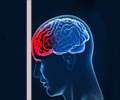Nearly seventeen per cent of adults surveyed in Ontario said they have suffered a traumatic brain injury that left them unconscious for five minutes or required them to be hospitalized overnight.

"We found that one in six Ontario adults reported a history of TBI," said Dr. Gabriela Ilie, lead author of the study and a post-doctoral fellow at St. Michael's Hospital. "That prevalence is higher than previously known. Equally concerning, is the rate of harmful behaviours reported by adults with a history of TBI."
The study, published today in Journal of Neurotrauma, showed that compared to their peers, adults with a history of TBI reported that they were:
- 2.9 times more likely to have taken opioid pain relievers -such as Percocet, Tylenol-3 or codeine- without a prescription in the past year
- 2.8 times more likely to have smoked cannabis in the past year
- twice as likely to have smoked cigarettes every day in the past year
- nearly twice as likely to have described experiencing psychiatric distress - such as depressed mood, anxiety, insomnia, and social dysfunction - in the past four weeks
The data used in the study were from the 2011 cycle of the Centre for Addiction and Mental Health's Monitor, a continuous, cross-sectional telephone survey of Ontario adults aged 18 and older.
"Medical practitioners should be aware of the potential association between substance abuse and brain injury," said Dr. Robert Mann, a senior scientist at CAMH and co-principal investigator of the study. "More research is needed, but it's possible that part of long-term TBI treatment may one day include screening for substance abuse and mental health problems to help address this issue."
Advertisement
In 2013, Dr. Ilie, Dr. Mann and other researchers showed similarly high rates of TBI and poor health behaviours among Ontario students between Grades 7 and 12.
Advertisement
Source-Eurekalert














